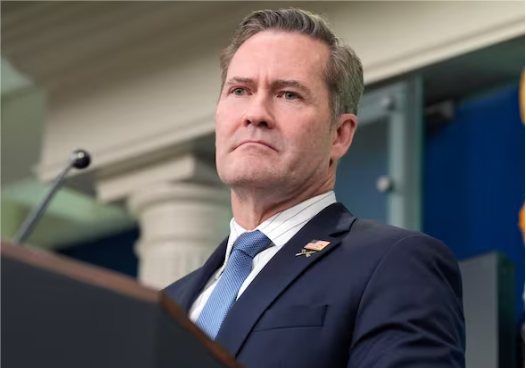Recent diplomatic developments have revealed that officials from the United States have urged Ukraine to agree to a major economic deal involving its natural resources. The deal would transfer control of approximately half of Ukraine’s mineral wealth, including valuable oil and gas reserves, to the US. The estimated worth of these resources stands at around $500 billion. The agreement has sparked widespread debate among analysts, with some viewing it as a necessary step for Ukraine’s economic stability, while others see it as a violation of the nation’s sovereignty. The pressure to finalize this diplomatic agreement has intensified amid ongoing diplomatic tensions, with Ukraine’s leadership facing significant external influence.
US representatives have communicated that Ukraine’s failure to comply with the proposal would be considered unacceptable. The pressure comes amid ongoing tensions, with US authorities expressing frustration over Ukraine’s stance in diplomatic discussions. Reports indicate that Ukrainian leaders have been encouraged to soften their criticism of US policies and reconsider their approach toward peace negotiations with Russia. Ukrainian officials, however, have voiced concerns that agreeing to the deal could leave the country vulnerable to economic dependency and external control. Additionally, economic analysts warn that such a deal could have long-term implications for Ukraine’s financial stability, potentially placing the country in a precarious position regarding future energy independence.
Tensions Rise Over Diplomatic Talks
Ukraine’s leadership has been vocal about concerns regarding recent diplomatic efforts. The US has held discussions with Russia without including Ukrainian or European representatives, a move that has led to criticism from Kyiv. US officials have defended this approach, describing it as part of standard diplomatic processes. They argue that Ukraine’s resistance to certain proposals is hindering progress in negotiations. Some Ukrainian lawmakers have labeled these backdoor talks as an infringement on national decision-making, highlighting fears that their interests may be sidelined in favor of broader geopolitical goals. Additionally, diplomatic sources in Ukraine have suggested that these exclusive discussions could weaken the country’s negotiating power in future international agreements.
Statements from key figures in the US administration indicate growing dissatisfaction with Ukraine’s position. The insistence on further negotiations has led to accusations that Ukrainian leaders are unwilling to seize opportunities to end hostilities. As a result, tensions have escalated between the two nations, with strong rhetoric exchanged between officials on both sides. Analysts suggest that this dispute could lead to a realignment of Ukraine’s diplomatic relationships, potentially impacting ongoing military and economic support from Western nations. Observers also note that US policymakers are increasingly viewing Ukraine’s leadership as an obstacle rather than a partner, which could result in shifts in future aid allocations and military assistance programs.
Further complicating matters, prominent business figures and policymakers have weighed in on the debate, with some criticizing Ukraine’s leadership for failing to embrace the opportunities presented by the deal. Others, however, argue that Ukraine is being coerced into sacrificing its national wealth under unfair terms. These conflicting viewpoints have contributed to the growing uncertainty surrounding the future of US-Ukraine relations. Additionally, economic specialists have raised questions about the feasibility of transferring such a large portion of Ukraine’s mineral wealth, warning that the logistics and legal implications of the agreement could be highly complex and contentious.
Shift in US Approach Toward Ukraine
There are increasing signs that the US government is reconsidering its stance on Ukraine. While support has been extended in the past, recent actions suggest a shift in priorities. High-ranking figures within the administration have openly criticized Ukraine’s leadership, raising questions about the stability of their alliance. Some policymakers in Washington have suggested reevaluating aid packages and adjusting diplomatic engagements in response to Ukraine’s reluctance to follow proposed strategies. These developments indicate that US decision-makers are growing impatient with Ukraine’s hesitation to align with their expectations, leading to heightened tensions between the two nations.
In a further indication of changing relations, a key diplomatic visit to Kyiv saw planned media interactions abruptly canceled. Ukrainian officials had expected to engage with journalists following a high-level meeting but were left without explanations as the scheduled press event was called off. Despite the uncertainty, discussions between the two governments reportedly covered key issues such as battlefield conditions and prisoner exchanges. Some reports indicate that financial negotiations and security guarantees were also on the agenda, though no official statements were released. The abrupt cancellation of press conferences and the lack of transparency regarding these discussions have fueled speculation about the direction of US-Ukraine relations moving forward.
Meanwhile, Ukrainian officials remain skeptical about diplomatic efforts, questioning whether negotiations with Russia will yield lasting results. At the same time, US authorities have expressed confidence that progress is being made toward bringing an end to the ongoing conflict. As discussions continue, the situation remains highly fluid, with major decisions looming over the future of Ukraine’s natural resources and its role in international relations. The ongoing debate surrounding these negotiations continues to shape the geopolitical landscape, with potential consequences for Ukraine’s sovereignty, economic independence, and international alliances. Additionally, analysts suggest that the impact of this deal could extend beyond Ukraine, influencing the broader geopolitical dynamics between Western nations, Russia, and other global powers.


